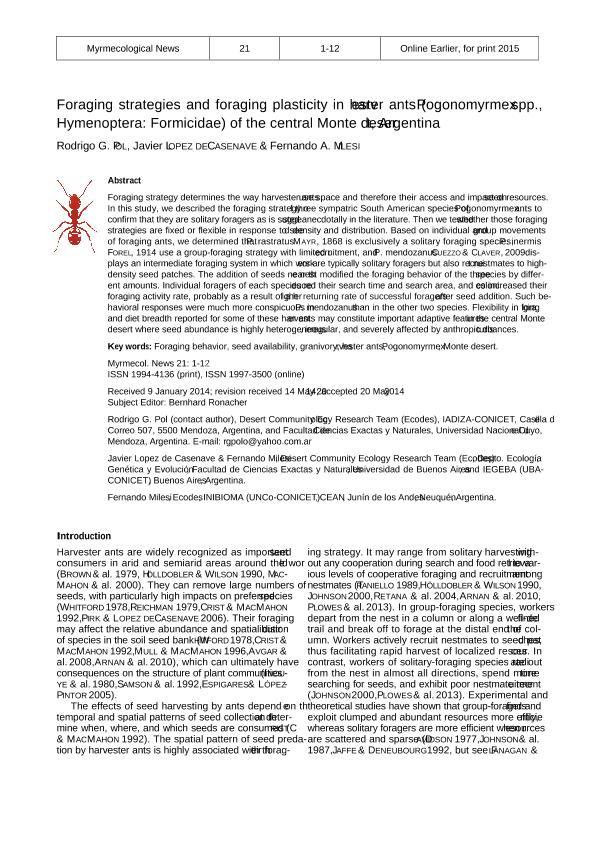Mostrar el registro sencillo del ítem
dc.contributor.author
Pol, Rodrigo Gabriel

dc.contributor.author
Lopez de Casenave, Javier Nestor

dc.contributor.author
Milesi, Fernando Adrian

dc.date.available
2017-01-26T21:58:15Z
dc.date.issued
2015-09
dc.identifier.citation
Pol, Rodrigo Gabriel; Lopez de Casenave, Javier Nestor; Milesi, Fernando Adrian; Foraging strategies and foraging plasticity in harvester ants (Pogonomyrmex spp., Hymenoptera: Formicidae) of the central Monte desert, Argentina; Oesterreichische Gesell Entomofaunistik; Myrmecological News; 21; 9-2015; 1-12
dc.identifier.issn
1994-4136
dc.identifier.uri
http://hdl.handle.net/11336/12059
dc.description.abstract
Foraging strategy determines the way harvester ants use space and therefore their access and impact on seed resources. In this study, we described the foraging strategy of three sympatric South American species of Pogonomyrmex ants to confirm that they are solitary foragers as is suggested anecdotally in the literature. Then we tested whether those foraging strategies are fixed or flexible in response to seed density and distribution. Based on individual and group movements of foraging ants, we determined that P. rastratus MAYR, 1868 is exclusively a solitary foraging species, P. inermis FOREL, 1914 use a group-foraging strategy with limited recruitment, and P. mendozanus CUEZZO & CLAVER, 2009 displays an intermediate foraging system in which workers are typically solitary foragers but also recruit nestmates to highdensity seed patches. The addition of seeds near the nest modified the foraging behavior of the three species by different amounts. Individual foragers of each species reduced their search time and search area, and colonies increased their foraging activity rate, probably as a result of a higher returning rate of successful foragers after seed addition. Such behavioral responses were much more conspicuous in P. mendozanus than in the other two species. Flexibility in foraging and diet breadth reported for some of these harvester ants may constitute important adaptive features in the central Monte desert where seed abundance is highly heterogeneous, irregular, and severely affected by anthropic disturbances.
dc.format
application/pdf
dc.language.iso
eng
dc.publisher
Oesterreichische Gesell Entomofaunistik

dc.rights
info:eu-repo/semantics/openAccess
dc.rights.uri
https://creativecommons.org/licenses/by-nc-sa/2.5/ar/
dc.subject
Foraging Behavior
dc.subject
Seed Availability
dc.subject
Granivory
dc.subject
Harvester Ants
dc.subject
Pogonomyrmex
dc.subject
Monte Desert
dc.subject.classification
Zoología, Ornitología, Entomología, Etología

dc.subject.classification
Ciencias Biológicas

dc.subject.classification
CIENCIAS NATURALES Y EXACTAS

dc.title
Foraging strategies and foraging plasticity in harvester ants (Pogonomyrmex spp., Hymenoptera: Formicidae) of the central Monte desert, Argentina
dc.type
info:eu-repo/semantics/article
dc.type
info:ar-repo/semantics/artículo
dc.type
info:eu-repo/semantics/publishedVersion
dc.date.updated
2016-12-12T14:23:13Z
dc.identifier.eissn
1997-3500
dc.journal.volume
21
dc.journal.pagination
1-12
dc.journal.pais
Eslovaquia
dc.journal.ciudad
Bratislava
dc.description.fil
Fil: Pol, Rodrigo Gabriel. Universidad de Buenos Aires. Facultad de Ciencias Exactas y Naturales. Departamento de Ecología, Genética y Evolución. Grupo de Investigación en Ecologia de Comunidades del Desierto; Argentina. Consejo Nacional de Investigaciones Científicas y Técnicas. Centro Científico Tecnológico Mendoza. Instituto Argentino de Investigaciones de Zonas Aridas; Argentina
dc.description.fil
Fil: Lopez de Casenave, Javier Nestor. Consejo Nacional de Investigaciones Científicas y Técnicas. Oficina de Coordinación Administrativa Ciudad Universitaria. Instituto de Ecología, Genética y Evolución de Buenos Aires; Argentina. Universidad de Buenos Aires. Facultad de Ciencias Exactas y Naturales. Departamento de Ecología, Genética y Evolución. Grupo de Investigación en Ecologia de Comunidades del Desierto; Argentina
dc.description.fil
Fil: Milesi, Fernando Adrian. Consejo Nacional de Investigaciones Científicas y Técnicas. Oficina de Coordinación Administrativa Ciudad Universitaria. Instituto de Ecología, Genética y Evolución de Buenos Aires; Argentina. Universidad de Buenos Aires. Facultad de Ciencias Exactas y Naturales. Departamento de Ecología, Genética y Evolución. Grupo de Investigación en Ecologia de Comunidades del Desierto; Argentina. Consejo Nacional de Investigaciones Científicas y Técnicas. Centro Científico Tecnológico Patagonia Norte. Instituto de Investigación en Biodiversidad y Medioambiente; Argentina. Universidad Nacional del Comahue; Argentina
dc.journal.title
Myrmecological News

dc.relation.alternativeid
info:eu-repo/semantics/altIdentifier/url/https://myrmecologicalnews.org/cms/index.php?option=com_content&view=category&id=610&Itemid=365
Archivos asociados
